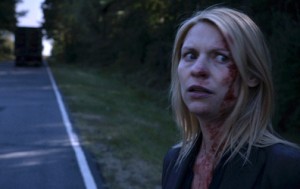Boyhood, Richard Linklater’s most recent film, had this kind of “cottage effect” on me. Shot intermittently over 12 years, it depicts the unhurried, unremarkable metamorphosis of a boy as he ages from 6 to 18. Nothing really happens in the film, at least not as we’ve come to expect from the conventional, action-packed narratives that are part of our typical entertainment diet. Studiously avoiding exaggeration, Linklater employs a quiet, understated realism. Instead of getting to know the people on screen through defining acts of high drama, they’re revealed to us through ordinary, low-key repetitions. We get to know Mason, the boy in the film, before his personality is formed, and this makes for an unusually intimate and sympathetic portrait. We’ve been watching his pain and hope since he was a child, and like a parent, we cannot but help love him for that, even if we might not actually like him all the time.
Linklater repeatedly foreshadows catastrophe in Boyhood, and I kept waiting for something to happen, some tragic and intense vector to come sparking out of the story, but no, life plods along its ordinary trajectory. This, of course, is the way that it works in most of our lives, too. When we distractedly check our phones while driving, most of the time we don’t crash, and so it is in this movie, but each time that alarm signal is given, we remember just how fragile and beyond our control life is, and how at any moment, it can explode in tragic directions.
For me, a middle-aged man, the movie took place in the immediate, blurred past (last 12 years) where everything feels like it was yesterday, but simultaneously, the movie also took me to my distant past. Mason’s experiences, although set to a different backdrop of music, technology, etcetera, were my experiences growing up, too, and this gave the movie a circular, timeless feel. Getting to know Mason was like getting to know somebody at a cottage, proximal rather than directly communicated. All of our lives, for all the plot and ambition we stack upon it, unfold along the same lines. Nothing that happens to us is singularly unique, and in the end we’re all small, and there’s a beauty and melancholy in this shared humility, I think, something that Boyhood manages to bring out. And although the movie might not fully engage you throughout its three-hour journey, it will stay with you.
]]>
The home-viewing options, although imperfect, are vast, and nothing could be easier than staying at home and watching Netflix at 8:00 or whatever other time might make my life simpler. Of course, Netflix is actually pretty lame, but in my life convenience now trumps quality, so instead of watching a movie I actually want to see like 12 Years a Slave, I end up binge-watching a TV show like New Girl. Such is the world that we, or at least, I, live in.
At any rate, Rachelle and I reached deep and mustered together enough will to go and see American Hustle at the theatre. This movie, directed by the successful but widely-despised-by-actors, David O. Russell, has been receiving all sorts of praise and is already a favourite to win the Oscar for Best Picture.
I liked the movie fine but was far from swept away. It’s a professionally crafted Hollywood film that features some big actors doing big acting in appealing wardrobe. Everybody is good, especially Amy Adams’ cleavage and Christian Bale’s hairpiece, but it’s one of those movies that actually looks better than it is.
The truth, I think, is that the movie was kind of incoherent, like a series of improvisations by talented actors that had later been stitched together by a director. It was as if Russell wasn’t thinking about how character and story fit together, but how each, individual scene would come across on it’s own. All the primary components of a film were showcased, without a film actually being composed from them, if that makes any sense.
Still, it was a pleasing enough experience, and in that regard it reminded me of Argo. Watching it, you felt like you were getting your money’s worth, that middlebrow Hollywood was functioning exactly as middlebrow Hollywood was supposed to function. The idea in Hollywood is to give the audience what they’re looking for, not to startle or elevate them, and movies like Argo and American Hustle are perfect examples of this—well made products where performance, the visible effort of performance, will always trump content. Regardless, the movie didn’t ask too much of us, and it didn’t give us too much either, but it was attractive and distracting, and on a cold, winter’s evening, well, that’s exactly what we want.
]]>And so for first-time director Aaron Wilson, who debuted his film Canopy at the festival, it must have been a validating and exciting experience. The movie has a very simple premise. An Australian pilot gets shot down while battling the Japanese over Singapore and improbably bonds with a Chinese soldier similarly trying to elude capture.
The central characters of this film—which is almost devoid of dialogue—aren’t really the actors playing the roles, but the jungle in which the story unfolds and the hyper-accented soundscape that surrounds them. Wilson is trying to do something different here, but in so doing Canopy comes across as more of a concept of a film than a film itself, an interesting idea in theory, but in practice maybe not so much.
It’s impossible to see this movie and not think of Terrence Malick’s The Thin Red line.
I don’t think that there’s a film on the planet that compares well to it, and Canopy is no exception. Although Canopy is beautiful to look at, it never establishes an emotional grip on the audience, relying too heavily on the mechanisms of filmmaking rather than the film itself. For instance, after a spell, the wordlessness of the movie becomes burdensome, a cinematic imposition rather than an organic necessity of circumstance and disparate languages. Clearly, the director wants us keenly focused on the canopy of sound covering the silent action, but he points us so intentionally in this direction it’s as if we’re following a neon-signs-lit detour route. The acoustics swiftly become a clumsy, almost naive contrivance that is master rather than servant to the film, pulling us away rather than in.
Perhaps if the actors were more expressive or physically compelling, the director’s reach wouldn’t have so exceeded his grasp. As it is, in spite of its lyrical flourishes and allusive passages, the movie has a constructed, almost humid weight. As we move from one poetic war trope to the next, as if in some theme park yet to be invented, Canopy does little more than ask you to like it.
When it ended, the near-full house applauded, as if in encouragement, it seemed, rather than appreciation. The director and his key people took the floor, ready for a Q & A, and the last amongst them to do so was the lead actor, Khan Chittenden. As is often the case, he was smaller and more vulnerable than you would have expected after having just seen him up there on the giant screen, and as he youthfully bounded down from his seat, he threw up an arm to the crowd, he too hoping for more than what was received.
]]>
However, soon enough I found myself distracted, focused more on placing the actors in their previous incarnations than whatever was unfolding on the screen.
“Look, there’s the guy from Parks and Recreation!”
“There’s Coach Taylor from Friday Night Lights!”
“I think the guy from The Sopranos is wearing a fake nose.”
“Man, that Jessica Chastain looks exactly like a young Julia Roberts!”
I don’t typically do this sort of thing when I’m watching a movie, so I figured that there must be something about Zero Dark Thirty, in particular, that was calling forth such a response. It was simple, I guess, the actors seemed more real to me than the characters that they were playing.
There was nobody in the movie that I liked or was particularly interested in, everybody seeming little more than a collection of suits doing their jobs. This might have been the directorial intent, but it kept me at an emotional and visceral distance, and the entire movie seemed procedural rather than human.
It was hard not to think of the TV show Homeland while watching, and how much of a better, deeper exposition of similar terrain it was than Zero Dark Thirty. I mean, I really, really liked Homeland, and had all sorts of feelings about the characters in the show, rather than about the actors hired to be those characters. Cable TV, with long narrative arcs, has become like reading a novel, while movies, with just 90 minutes or so, (or in the case of Zero Dark Thirty, 157 minutes) has to tell you a kind of hieroglyphic story, one that has to have an immediate commercial punch. And so TV shows, now digested slowly, as seasons rather than episodes, are like novels, and movies are more like an episode of a TV show, bound by all the limits of the prime time formula. It’s ironic, this, but such is life, and it is funny to observe that the consensus best movie of the mainstream this year, pales in comparison to one of the best TV shows of the year.
Sententious films like Lincoln and Zero Dark Thirty–arguably made for critics and awards shows– rarely end up serving the audience, whereas films like Pitch Perfect or The Perks Of Being A Wallflower, that are built to serve the audience, are actually much greater critical accomplishments. When the intent is to create something serious for an audience, or the critics that hover above the audience, rather than something authentic or organic within the artist, the results are always distant and insufficient, a suggestion of intent rather than the realization of it, and that artifice will always keep the true audience at bay.
]]>









